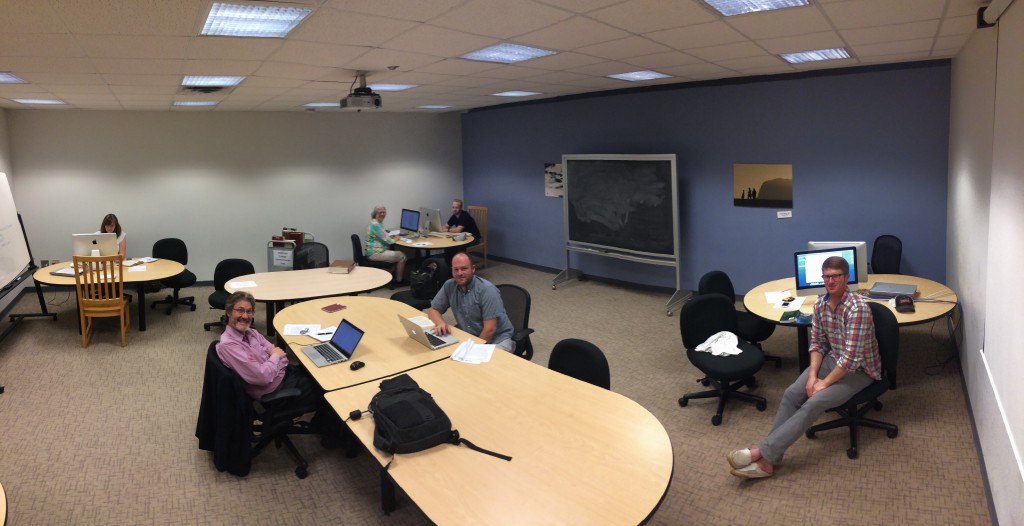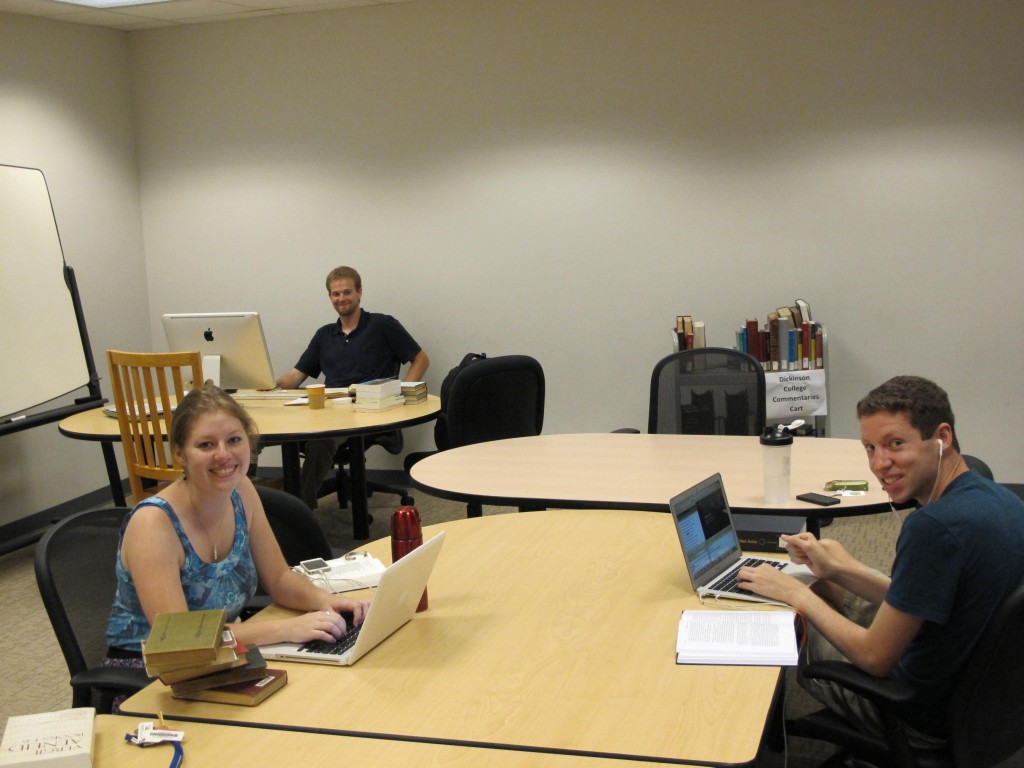The Bryn Mawr Classical Review has just published a fine and very positive review of the new three-volume Virgil Encyclopedia edited by Richard Thomas and Jan Ziolkowski. After praising it and describing its emphases in comparison with its Italian predecessor, the Enciclopedia Virgiliana, the reviewer, Sander Goldberg of UCLA, makes what has become something of a standard plea in reviews of such print reference works that they could be better done on line. But he makes it in a characteristically eloquent way:
Students in particular have already found an inviting and increasingly popular alternative, though the VE‘s editors are not kind to it: ‘a printed encyclopedia of this sort is also a world apart from the web. It offers material that does not have to be unearthed by sorting through a dung-heap in which pearls of truth are buried amid mistakes, exaggerations, and misunderstandings. The volumes have been vetted and edited for accuracy and clarity’ (lxx). I share their dedication to vetting and editing. Virgil may have had to search for pearls in a dung-heap, but his modern readers should certainly be spared that experience. Yet the editors invoke what is, or ought to be, a false dichotomy: an encyclopedia of this sort is a world apart from the web largely because no effort has been made to unite the accuracy and clarity of the former with the flexibility and accessibility of the latter. It is clearly not (or not yet) in Wiley-Blackwell’s interest to do so, but it is most certainly in our interest to have it done, and at some point the editors and contributors to projects like this one are going to have to demand that their labor, their expertise, and their sheer love of the enterprise be given a more progressive format. Their own dedication to the field, so richly displayed in these volumes, deserves nothing less.
Well said, Prof. Goldberg. He also points out that the current print publishing model militates against the detailed exploration of language:
Nuances of Latin vocabulary are not as easily grasped as what even a Google search will quickly supply regarding “Accius” and “Alcuin”, while a philological question that goes unanswered is all too likely in time to become a question that goes unasked. Other technical matters are not so fully ignored, but can be significantly compressed: details may then be difficult to locate and extract. WhereEV foregrounded such matters as ablativo assoluto, accusativi plurali in –is, eīs ed es, and accusativo alla greca, VE relegates them to entries on “syntax” and “morphology”, with other, briefer treatments in “Grecism” and “Hellenism, linguistic”. These are, I hasten to add, very good and useful entries, but the compressed attention to linguistic form and structure is again indicative of a shift away from the tools of close reading and the basic philological information that modern readers increasingly require to read Virgil in Latin with a depth of understanding that the editors may too readily be taking for granted in their audience.
These are problems that DCC is committed to tackling and solving to the extent that we can. In the coming weeks we will publish a database of Vergilian vocabulary, based on the superb work of Henry Frieze, with comprehensive, accurate word frequency information for the Aeneid supplied by LASLA. This tool will be part of a larger planned multimedia edition that will have as much linguistic and stylistic help as we can pack into it for readers who want to dig in to the Latin. More information about the overall plan is here and here. Please don’t hesitate to contact me if you would like to get involved. I know for certain we will have our copy of the Virgil Encyclopedia handy as it develops!
Update 8/29/2014
The editors of BMCR published the following note apologizing for an omission in this review, and it contains some information about the possibility of an electronic version of the Virgil Encyclopedia:
A recent review (BMCR 2014.07.40) greeted the arrival of The Virgil Encyclopedia with admiration and approval. The online posting of the review is now prefaced, however, with an apology from the editors, which we are glad to repeat here. Professor Goldberg in reviewing had included information about the online edition of the Encyclopedia that was omitted when we transmitted it to our readers. The mistake was awkward inasmuch as Professor Goldberg made concluding comments about the future of reference works such as this which read very differently and very unhelpfully in the absence of complete information about this reference work.
As we understand it, the state of play is that there is indeed an e-version of The Virgil Encyclopedia available from Wiley-Blackwell, chiefly of interest to institutional subscribers. From the descriptions we have seen, it is an e-book in the contemporary mode, that is, a digital representation of a traditional print volume. It contains internal links, but does not reside in the fullness of the web of outward, to say nothing of inward, links. In Professor Goldberg’s review, he expresses regret that more movement in that direction did not happen and by implication suggests that more will happen in the new Oxford Classical Dictionary for which he will be responsible. Professors Thomas and Ziolkowski, editors of The Virgil Encyclopedia, are understandably unsettled that the review was released in a way that exacerbated intellectual disagreement with a muddled statement of facts for which we are responsible. For that indeed, we do apologize.
The larger question of the fate of reference works is one that many will continue to discuss. As always these days, we live in a moment of dazzling innovation that will, doubtless, seem palely antique more quickly than we might imagine.
 Participants in the 2014 Dickinson Summer Latin Workshop (left to right): Christine Kahl, Will Darden, Peter Rook, Catherine Zackey, Faye Peel, Wells Hansen, Ashley Leonard, Scott Paterson, Paul Perrot, Kaori Miller, Jennifer Larson, Hugh McElroy, Janet Brooks, John Landis, Will Harvard, Daniel Cummings, Andrea Millius, Jacqueline Lopata, Bernie Gygax, and Laurie Duncan.
Participants in the 2014 Dickinson Summer Latin Workshop (left to right): Christine Kahl, Will Darden, Peter Rook, Catherine Zackey, Faye Peel, Wells Hansen, Ashley Leonard, Scott Paterson, Paul Perrot, Kaori Miller, Jennifer Larson, Hugh McElroy, Janet Brooks, John Landis, Will Harvard, Daniel Cummings, Andrea Millius, Jacqueline Lopata, Bernie Gygax, and Laurie Duncan. We met for the week of July 13, 2014, and read selections from Lucretius, led by Wells Hansen and Chris Francese. Two new elements were a daily happy hour, with drinks and light refreshments in front of East College from 4:00-5:00; and the optional session to work on the Dickinson College Commentaries project in the afternoons from 2:00-4:00, helping harvest notes for the projected multimedia edition of the Aeneid. Here are some of the comments from participants:
We met for the week of July 13, 2014, and read selections from Lucretius, led by Wells Hansen and Chris Francese. Two new elements were a daily happy hour, with drinks and light refreshments in front of East College from 4:00-5:00; and the optional session to work on the Dickinson College Commentaries project in the afternoons from 2:00-4:00, helping harvest notes for the projected multimedia edition of the Aeneid. Here are some of the comments from participants:

